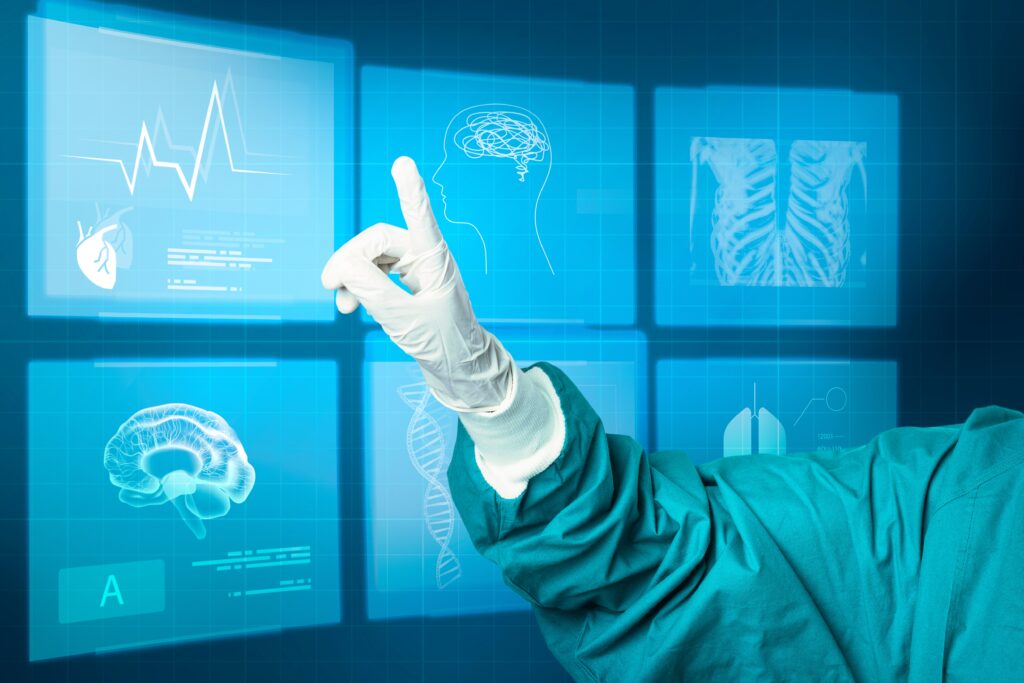The Transformative Power of AI Healthcare
AI healthcare is one of the most exciting and rapidly evolving technologies in the world today—and its impact on healthcare is nothing short of revolutionary. From enhancing diagnostics to shaping the future of treatment, AI healthcare is unlocking new possibilities in medicine. But how exactly is AI changing the way we approach healthcare, and what does the future hold? Let’s take a deep dive into this game-changing technology and explore its profound effects on the healthcare sector.
Table of Contents
Toggle1. Revolutionizing Diagnostics: AI Healthcare’s Accuracy and Speed

AI healthcare’s first and most significant contribution lies in the realm of diagnostics. By analyzing vast amounts of medical data—ranging from imaging scans to patient records—AI tools are helping doctors make faster, more accurate diagnoses. Machine learning algorithms can now sift through data with incredible precision, recognizing patterns that may escape even the most experienced healthcare professionals.
In fields like radiology, AI healthcare has already demonstrated its ability to spot abnormalities in X-rays, CT scans, and MRIs, often identifying early-stage diseases like cancer that might otherwise go unnoticed. These AI-powered tools don’t just speed up the process; they enhance its reliability, allowing doctors to provide timely interventions that improve patient outcomes.
2. Personalized Medicine: AI Healthcare Tailoring Treatment Plans
Imagine a world where your treatment plan is designed specifically for you—based on your unique genetic makeup, lifestyle, and medical history. Thanks to advancements in AI healthcare, this future is already becoming a reality. By analyzing data from various sources, including genetic information and past treatment responses, AI can assist doctors in crafting highly personalized care plans.
This technology is particularly impactful in the treatment of complex diseases like cancer, where every patient’s response to therapy can differ. AI healthcare helps predict how a patient will respond to certain treatments, enabling healthcare providers to choose the most effective therapy and potentially avoid adverse effects from trial-and-error approaches.
3. Surgical Precision: AI Healthcare in the Operating Room

Surgery is one of the most critical aspects of healthcare, and the addition of AI-powered robotics is taking it to the next level. AI-assisted surgical systems, like the da Vinci Surgical System, offer unmatched precision and control, allowing surgeons to perform minimally invasive procedures with greater accuracy.
These AI-driven robots can also analyze real-time data during surgery, offering insights and suggestions that enhance the outcome. In delicate surgeries, this extra layer of intelligence can make all the difference, reducing complications and speeding up recovery times for patients.
4. Improving Efficiency: The AI Healthcare-Powered Administration Revolution
Healthcare administrators face the constant challenge of managing complex tasks, such as scheduling, billing, and patient record-keeping. Fortunately, AI healthcare is helping streamline these processes. Automating routine administrative tasks allows healthcare workers to focus more on patient care rather than paperwork.
AI tools can optimize appointment scheduling, ensuring that patients receive timely care without wasting resources. In billing, AI systems can catch errors and inconsistencies, reducing delays and ensuring that insurance claims are processed smoothly. This efficiency ultimately leads to cost savings and a smoother experience for both healthcare providers and patients.
5. Accelerating Drug Discovery: AI Healthcare in the Search for New Treatments
Developing new medications is a long, expensive process that can take years or even decades. However, AI healthcare is changing the landscape of drug discovery. By analyzing enormous datasets and predicting how different molecules might interact with the body, AI can dramatically speed up the identification of promising drug candidates.
AI healthcare isn’t just helping to create entirely new drugs; it’s also being used to find new uses for existing medications. By examining vast databases of medical information, AI systems can identify off-label uses for drugs, potentially reducing the time it takes to bring effective treatments to patients.
6. Overcoming Challenges: Addressing Data, Bias, and Ethics in AI Healthcare
While the benefits of AI healthcare are vast, it’s important to acknowledge the challenges and risks that come with its implementation. One of the main concerns is data privacy and security. With AI relying on vast amounts of patient data, ensuring this information remains protected from breaches is essential.
Another challenge is bias in AI algorithms. If these systems are trained on biased data, they could lead to inaccurate predictions or outcomes. To ensure fairness, it’s crucial that AI models are tested and updated regularly with diverse and representative data sets.
Furthermore, as AI healthcare becomes more integrated into the system, it’s essential to remember that these systems should complement human healthcare providers—not replace them. The collaboration between human expertise and AI can result in better patient care, but the human touch will always remain crucial in healthcare.
7. Looking Ahead: The Future of AI Healthcare

The potential for AI healthcare is limitless. As the technology continues to advance, we can expect even more groundbreaking innovations, such as AI-driven virtual health assistants, more efficient diagnostic tools, and treatments tailored even more precisely to individual needs. AI will not only improve the quality of care but also make healthcare more accessible, especially as it helps reduce costs and increase efficiency across the system.
But the key to AI healthcare’s success lies in its responsible use. It’s up to healthcare providers, technology developers, and policymakers to ensure that AI is used ethically and equitably, safeguarding patient privacy and promoting fairness in treatment.
Conclusion: A Healthier Future Powered by AI Healthcare
AI healthcare is more than just a buzzword in medicine—it’s a transformative force that is already improving the way we diagnose, treat, and manage health conditions. By harnessing the power of AI healthcare, we are entering an era where medical care is not only faster and more accurate but also more personalized and accessible. As we continue to explore AI’s vast potential, one thing is clear: the future of healthcare will be smarter, more efficient, and more patient-centered than ever before.
Additional Resources
For broader insights into technological advancements, visit dotbuzzinfo.com.
Explore our take on anime evolution in The Incredible Evolution of Shounen Anime.
Discover more health-related content such as the Health Benefits of Avocados.


Pingback: Ghost Of Tsushima: Legends Anime Coming In 2027